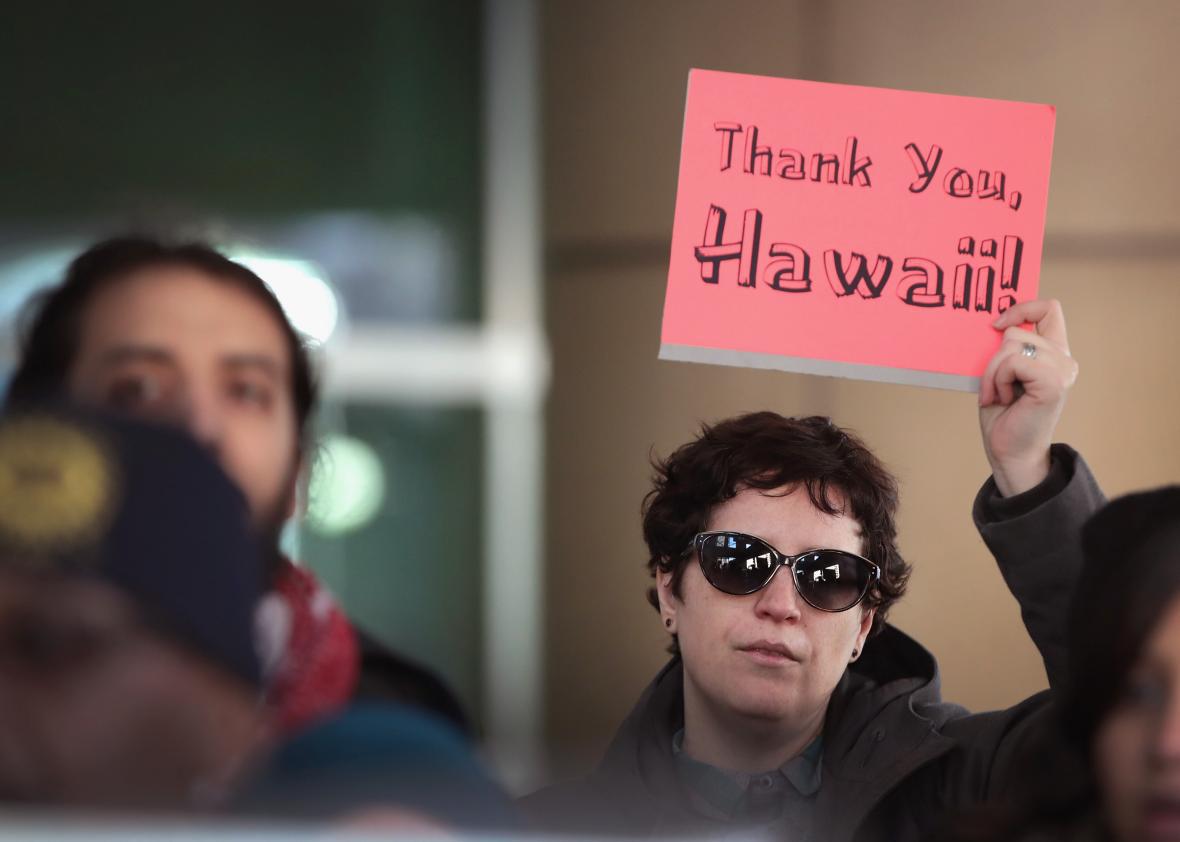A federal court judge in Hawaii on Tuesday issued a temporary injunction blocking much of Trump’s third try at a travel ban just hours before it was scheduled to go into effect nationwide. Federal District Judge Derrick Watson, who had weighed in last March on an earlier version of the President’s executive order, based his decision not on broad constitutional claims about the anti-Muslim animus that infected the ban, but rather on the same analysis used by the Ninth Circuit Court of Appeals when it set aside the earlier version of the law: a statutory argument that the President has exceeded his authority under federal immigration law.
Trump’s first two attempts at travel bans—issued in late January and then reissued in March—had been struck down by two appeals courts, and then partially revived in June by the Supreme Court, which allowed portions of the Executive Order to go forward but provided that refugees with bona fide connections to Americans could not be barred from entry. Part of that latter order had expired, and the remaining issues were to be heard this past week at the high court. But that appeal was dismissed after President Trump signed his third travel ban September. This iteration would have been indefinite and would have gone into effect at midnight Wednesday. It barred certain travelers from Syria, Libya, Iran, Yemen, Chad, Somalia, North Korea and Venezuela. The third ban was substantially similar to the one before it, but Trump had removed Sudan from the list and added Chad, North Korea, and Venezuela.
The plaintiffs seeking an injunction this time, as they were last spring, are the state of Hawaii, a Muslim Imam and several John Does with families that will be unable to travel to the U.S. under the ban. (A similar challenge to the travel ban is currently being heard in a Maryland court.) Watson’s 40-page order will have the effect of pausing the ban with respect to all of the specified countries, except North Korea and Venezuela. (Plaintiffs didn’t ask for an injunction for those two countries.) Having reviewed the third order, Watson concluded that it “suffers from precisely the same maladies as its predecessor.” He noted that the new version still “lacks sufficient findings that the entry of more than 150 million nationals from six specified countries would be ‘detrimental to the interests of the United States,’” and that it “plainly discriminates based on nationality in the manner that the Ninth Circuit has found antithetical to both Section 1152(a) and the founding principles of this Nation.”
Although rooting his analysis in the president’s statutory authority and the lack of individual findings with respect to the countries singled out, Watson also notes in his opinion that the plaintiffs challenged the ban in part because the original ban was an attempt to create a Muslim ban, and that Trump “has never renounced or repudiated his calls for a ban on Muslim immigration.” He cites Trump’s tweets to support the proposition that the president never wanted anything less than the original ban as promulgated. Judge Watson then directs acting Homeland Security Secretary Elaine Duke and Secretary of State Rex Tillerson not to implement the ban.
Also noteworthy in the judicial smack talk department is Watson’s opening paragraph, striking in its subversive reference to the current standoff over the patriotism of NFL players: “Professional athletes mirror the federal government in this respect,” Watson writes. “[T]hey operate within a set of rules, and when one among them forsakes those rules in favor of his own, problems ensue. And so it goes with EO-3.”
One can safely assume that this decision will be appealed as soon as possible to the Ninth Circuit. But for now, score this as another temporary setback to the Trump agenda from a judge whose state Attorney General Jeff Sessions once wrote off as an “island in the Pacific.”
